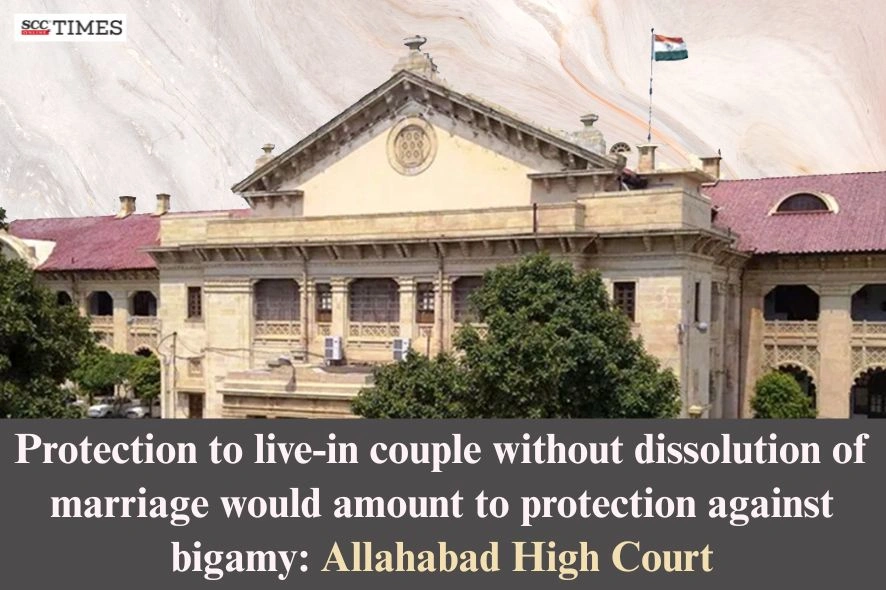Disclaimer: This has been reported after the availability of the order of the Court and not on media reports so as to give an accurate report to our readers.
Allahabad High Court: In a writ petition filed by the petitioners seeking directions for Respondent 4, Petitioner 1’s husband, to not interfere in their peaceful life and to provide protection, a Single Judge Bench of Vivek Kumar Singh, J., held that if the said protection was granted, it would amount to granting protection against commission of offences under Sections 494 and 495 of the Penal Code 1860 (‘IPC’). Thus, the Court dismissed the petition.
Background
Both petitioners were majors and were living together on their own free will for two years. It was alleged that Respondent 4 was causing hindrance in their peaceful life. In September 2025, Petitioner 1 submitted an application to the Senior Superintendent of Police stating she was the wife of Respondent 4 but was now living in a relationship with Petitioner 2, and her husband-Respondent 4 was threatening her.
The respondent contended that no marriage certificate was produced, and no divorce decree existed as only a divorce suit was filed which was pending.
Analysis and Decision
The Court stated that “In the relationship of a marriage or a live-in relationship, there must be two consenting adult human beings. The concept of Gotra, Caste and Religion is left way back. No one has the right to interfere in the personal liberty of two adults, not even the parents of the two adults can interfere in their relationship, but, the Right to Freedom or Right to Personal Liberty is not an absolute or unfettered right, it is qualified by some restrictions also. The freedom of one person extinct where the statutory right of another person starts.”
Further, the Court noted that a spouse has statutory right to enjoy the company of his or her counterpart and he/she cannot be deprived of that right for the sake of personal liberty and no such protection can be granted to infringe statutory right of the other spouse, hence, the freedom of one person cannot encroach or overweigh the legal right of another person. Hence, the Court opined that if the petitioners were already married and had their spouse alive, he/she could not be legally permitted to enter a live-in relationship with a third person without seeking divorce from the earlier spouse. He/she should first obtain the decree of divorce from the Court of competent jurisdiction before solemnizing marriage entering live-in in a relationship out of their legal marriage.
The Court noted that a couple should be of legal age to be qualified to enter legal marriage including being unmarried and they should be akin to spouse for significant period, and held that there was nothing on record to show that the petitioners were living as husband-wife or they had solemnized marriage after obtaining divorce from the earlier marriage. Further, there was no proof of joint account, financial security, joint property or joint expenditure produced to substantiate that the petitioners were akin to spouse.
The Court stated that “Such a relationship does not fall within the phrase ‘live-in relationship’ or ‘relationship in the nature of marriage’.” Further, the Court held that if the protection as prayed for was granted, it would amount to grant protection against commission of offences under Sections 494 and 495 of the IPC.
Further, the Court emphasized that it is settled law that writ of mandamus can be issued if the petitioner has a legal right to the performance of a legal duty by the party against whom the mandamus is sought and such right must be subsisting on the date of the petition. It is also settled that it cannot be issued contrary to law or to defeat a statutory provision including penal provision. The Court thus held that the petitioners did not have legally protected and judicially enforceable subsisting right to ask for mandamus.
Hence, the Court stressed that the petitioners who were in live-in relationship without obtaining decree of divorce from the competent Court would mean that the previous marriage deemed to be subsist in the eye of law. The Court held that protection to the petitioners who claim to be in a live-in relationship, in such cases, could not be granted in the exercise of powers conferred under Article 226 of the Constitution.
Accordingly, the Court dismissed the petition.
[Sonam v. State of UP, 2025 SCC OnLine All 7539, decided on 7-11-2025]
Advocates who appeared in this case:
For the Petitioner: Imaran Ahmad
For the Respondent: C.S.C.




